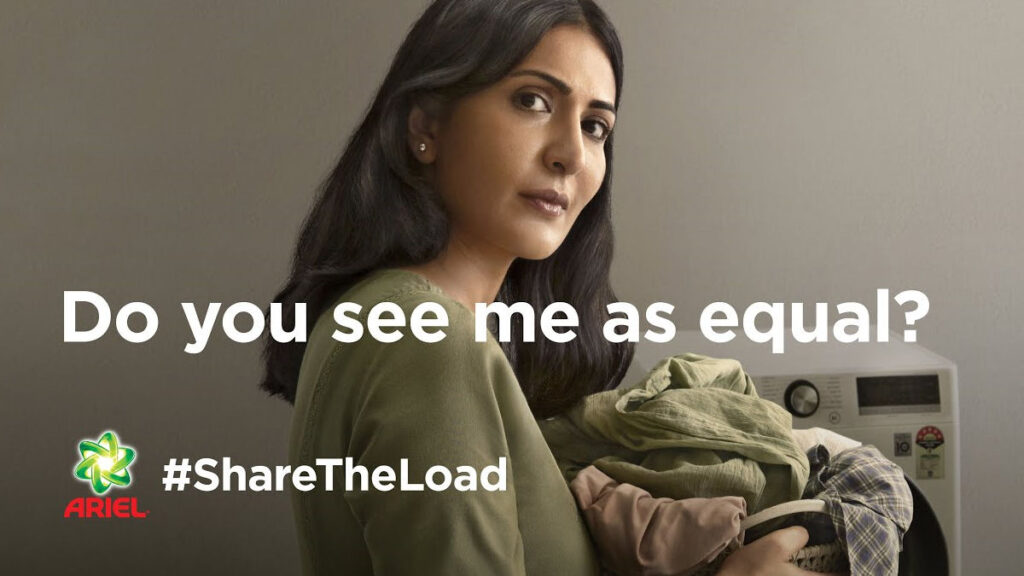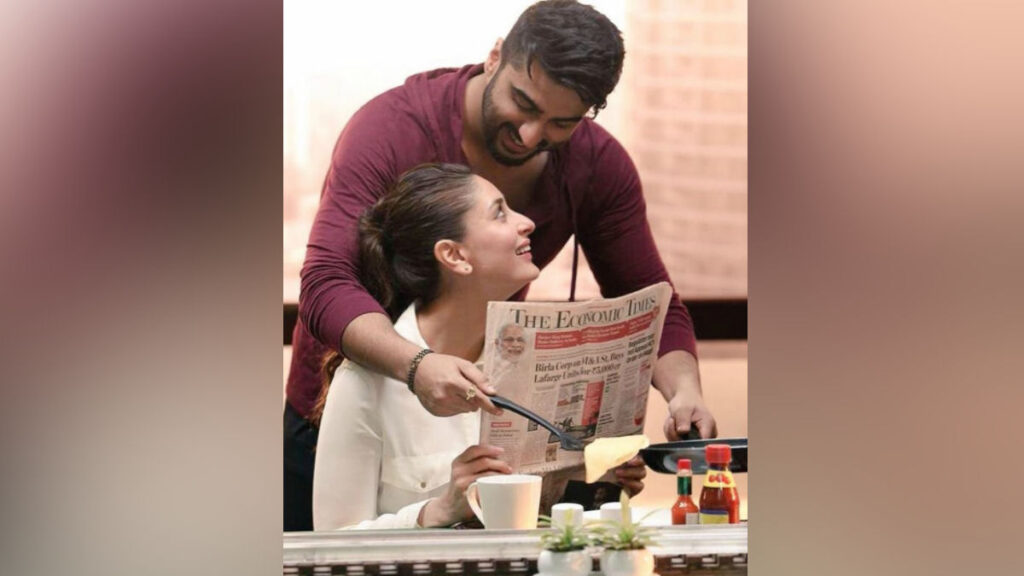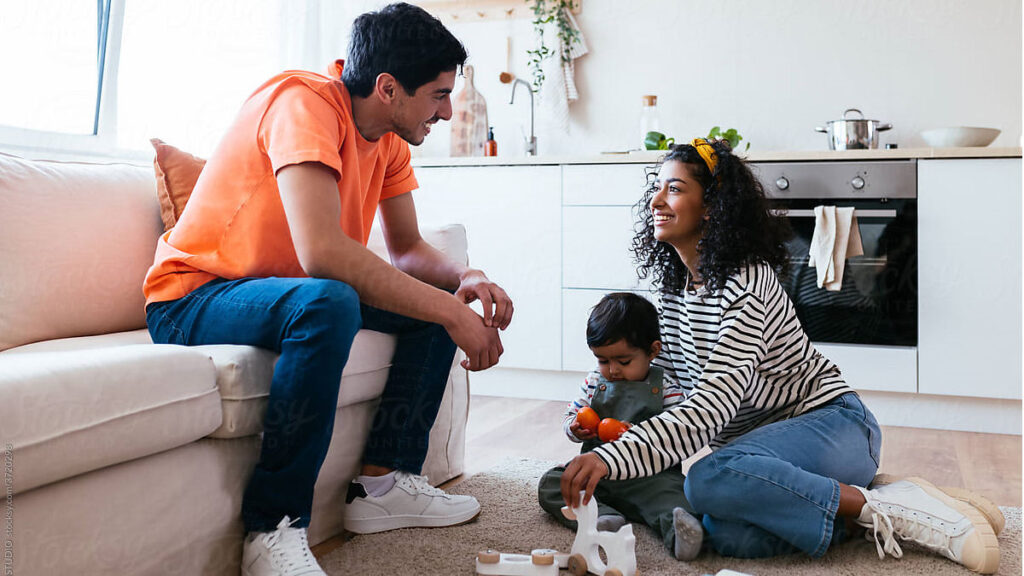Equality In Marriage
What is equality in a marriage? To some it means that both the partners need to make the same amount of money, to some it means sharing the household duties equally, or to some sharing the parenting responsibility uniformly. The concepts of equality are based on what we imbibed from our parents and our ancestors. When two people marry, each may carry a different notion of an equal, and equality in a marriage. My City Links explores this trait among people across the state and engages in the very important conversation of ‘sharing the load’ in a marriage.
See Equal, Share The Load
According to the statistics uncovered by Ariel as part of their new ad film, See Equal, for the award-winning Share The Load movement, 83% of Indian women surveyed feel that men don’t see them as equal when it comes to housework. It’s especially startling when 73% of men admit they shouldered equal responsibilities when they lived with roommates or in hostels as bachelors. The notion that the woman is solely responsible for executing household duties is still highly prevalent across social strata. The pandemic may have temporarily righted the balance, but the survey by Ariel found that seven out of 10 women said their partners helped with chores during the lockdown but stopped it later. Even though many husbands had demonstrated their housekeeping skills during the pandemic’s peak, it didn’t translate into a permanent equal partnership.
“When my mother married my father, she didn’t even know how to boil rice. My dad jokes about sitting down to eat dinner once and being surprised that his spoonful of dal and rice was crunchy. Turns out, his young wife didn’t know that rice had to be cleaned before being cooked. Forget al dente, this meal was clearly meant to send them both straight to the dentist,” laughed Shreya Padhi sharing her parents’ story.

It’s this inequality that the brand highlights in season 5 of their campaign. In the film, you see a couple visit their neighbours, and find the two boys engaged in household chores. The husband proudly declares that he did the same as a bachelor. On realising that the husband used to split the chores with his roommate, but doesn’t do it with her, she asks a hard-hitting question, “You don’t see me as equal, do you?” Suddenly aware of his patriarchal conditioning, the husband takes a first step towards practising equality in his own home by doing the laundry.
“Over the years, they’ve figured out domesticity together. She taught him that red shirts and white kurtas can’t be casually thrown into the laundry together unless you want to wear nothing but pink every day of your life. But the funniest part is watching people’s reactions when they hear that my dad shares the load. The women all want to know what magic spell my mother cast. The men wonder whether my dad lost a bet. And my Grandma is not pleased seeing all this. But over the years I’ve seen people accept and appreciate this trait of my parents. I have grown up seeing this cute couple sharing the load and it could not make me feel prouder,” chuckled Shreya.
Being equal partners in a marriage entreats us to recognise the gender disparity in our own homes, and the subtle ways in which this imbalance of power impacts a woman’s confidence and feelings of self-worth. With a single question, the wife stands up for herself. The deep-rooted prejudices are challenges for women that they are made aware of every now and then. It’s a moment that we hope women around the country will draw strength from, especially considering 88% of women believe it is time to talk to men about doing their share of the household chores equally. Indeed, when we ‘see equal, we share the load’.
Making The Cut
The fundamental principles of equality in a marriage are mutual respect and positive communication between the couple. The terms of this arrangement are different for each couple, based on their personal interplay or chemistry. Equality can’t always be measured in tangible form but it can vary, based on each couple’s capacity or choice, as long as both the partners mutually agree to it.

Interestingly, there is no correct way or formula to follow for equality in a marriage, but there are certain rules to follow to ensure harmony. There shouldn’t be any discrimination against either partner on factors like gender or salary. For example, holding the wife responsible for all the household work or casting the husband in a breadwinner role are based on traditional assumptions, and may not comply with the couple’s preferences or individual choices. Each couple has to decide on the right balance based on their strengths and weaknesses. The basic tenet remains respect for the other partner, as a human being. In a marriage where both partners are equal, neither of the partners can impose their will on the other.
“To me, equality in a marriage means sharing responsibilities of household duties including cooking, sharing financial expenses, family planning decisions and upbringing of the child. This shall be in mutual understanding as per choice between both partners. The age-old mindset that women are meant for cooking only and men are wholly responsible to earn bread and butter has changed, still, India has a long way to go in terms of gender equality and women empowerment. But there are chances of a social transformation and change gradually brought by Gen-Z and Gen Alpha. As a working woman staying alone in Bengaluru, I struggled to maintain household chores alongside working from home. But luckily my husband would lend me a helping hand during lunchtime and most of the time we both would cook dinner together. Cooperation and participation are key to marital bliss and harmony,” shared Zeba Rukhsar, a beaming wife.
Equality in marriages can be a fluid process, and it may change over time between couples, as long as there is respect and effective communication between them. When a couple views each other as equals, treats each other with respect, is considerate towards the other’s opinion, and supports each other, it shows the couple has an equal stake in their relationship. These kinds of partners have a common goal, and they work towards it, as a team. They are committed to their relationship, and they provide unconditional support for each other.
Many social, and familial pressures or misplaced self-respect can interfere with it. Gender roles often skew the equality ratio. Statistically, it has been proven that women spend an unfair and unequal amount of time in household work, and have the major bulk of responsibility for child-rearing, irrespective of their professional career choices.

“Respecting each other, understanding each other, being there for each other and valuing the views of the partner in important decisions matters. Two people can never be the same, they will have differences but it is important to respect each other and to communicate. Marriage should be built on the basis of trust and friendship, love is an exaggeration that might fade away with time. Little things can spark up the relationship such as going for groceries together, cooking together, cleaning the house together, making breakfast, and doing laundry. Basically, it is just about not defining a role as per gender but by being responsible and equal entrants in a marriage,” shared Nirlipta Patnaik.
Men make more decisions which have an impact on both the partners. Men, as per societal norms, are discouraged from helping in household chores or child-rearing activities, as it is considered more of a woman’s responsibility. Even though women are stepping out to take up jobs that have traditionally been a man’s domain, men still show reluctance towards household labour. This may lead to resentment in most women leading to a single-parent syndrome despite being in a marriage. They end up being the always-overlooked ones during decision-making, recipients of household drudgery and not enough caring, love, or support from the other partner. And these are just a few points in an incomplete list.
Mutual Benefit And Gratification
Most of us want an equal footing in our relationships. Couples can start by having constructive or positive communication with each other. They need to really listen, and modify their behaviour if it has some offending elements. Each conversation has to have respect in it. Besides, emotional manipulation or guilt-tripping will defeat the purpose.
To tackle the unequal distribution of the household workload, a teamwork approach has to be taken. Start with what needs to be done, emphasise that as a team we need to stick together, and then try to divide the work as per your mutual understanding, and capabilities. If you have kids, involve them in the chores distribution, too. There should be a feeling of belonging in the family where the common goal is a well-run household. Each member must take ownership and must be invested in the success of the idea. Offer help where you can, that way offers of help will come to you, too.

Siddharth Samantray who is planning to get married soon expects a partner who is assertive about her role in the marriage and is strong enough to voice her opinions and expectations. “Equal roles and responsibilities are mandatory. I have been living alone for a long time now and do all my chores myself. I don’t expect to change that post marriage. Equal marriage is on my mind but to trump it, I want a perfect marriage that has no blame games, gives proper time to one another and plans the future mutually. So this is what my definition of marriage is,” he shared his opinion.
Monetary imbalances can also be handled delicately in a marriage. Decide the responsibilities and bill payment schedules with your spouse. Effective communication can clear a lot of misunderstandings.
“If you feel that tenderness, love, and care are on the lesser side in your relationship, some things can be worked out to resolve that. Appreciate your spouse, when he does something for you, and repeat it a few days later. Start a weekly or fortnightly ‘five-minute courtship ritual’, where each partner states what they appreciated in the other, what troubled them, and what made them feel great, in that time period. This leads to much clearer communication, sets the precedent for what makes you happy or upset, and may act as a course correction in the future. Tell your partner that you feel unappreciated, at times, just talking about it can also bring changes as the other person may not be aware of your inner frustrations,” shared Basanti Devi who has been leading a happy married life for over 5 decades.
An important aspect of equality in a marriage is mutual respect, but women, have to learn to respect themselves first. A happy marriage needs happy partners- partners who respect each other and most importantly, themselves. It is all part of an equation where any missing parameter will not provide the right solution. All couples aspire to have a happy and everlasting marriage. But to achieve that, they need to constantly evolve, keeping the core values of mutual respect and consideration constant, and the communication channel always open. It is not an easy feat for either sex, as, for some, it may require behaviour readjustments, but with the goal of equality and its benefits, it is possible, as long as both partners want to work towards it. Like a team.
Equality Begins At Home
Most married people openly acknowledge the hard work put into a marriage. Of course, a lot of factors determine the health and longevity of any union, but mainly it is an unconscious attempt to replicate the primary model we witnessed first-hand, that is, our own parents’ marriage.

“I had been in an abusive marriage for a long time. My children saw me toil all day and be subjected to physical abuse when my husband returned home at night. He wasn’t a drunkard or addict, as most cases are. He believed in asserting his supremacy by showing me down. I had a Masters’s degree in Literature then and he wasn’t much educated. My son couldn’t tolerate this anymore. He was 19 years old then. When my husband’s belt struck me, he caught his father by the collar and pushed him down. And then dialled 100. We have been separated since then and there is no going back,” shared Sashi Panigrahi, who is now an English professor.
Men can bristle at the slightest gender disparity directed at their daughters, while their wives roll their eyes at the double standards. The #MeToo movement saw a lot of fathers and daughters avoiding each other’s eyes. Power structures in the nuptial arena can turn the bedroom into battlefields. The scars are borne, of course, by the children, who go on to distrust the opposite sex and start marriages by putting on armours. Honest couples own up to the daily struggle within marriages.
Why The Gap?
During the past 20 years, the number of women and men who endorse egalitarian relationships has steadily increased. Yet, marital inequality continues to be the norm. Men and women were equally likely to endorse relationship equality as an ideal. Women, however, rated equality as less important to men than men reported it to be, and men rated equality as more important to women than women reported it to be.
Talking about weddings is said to be our national pastime. It almost seems that a career or study or other ambitions in life are incomplete without marriage. With the government contemplating changing the legal age of marriage for women from 18 to 21 in India, this topic is again under the lens of the need and rationale of legislation for an institution which is historically a social practice for making an economic unit to create bonds, control inheritance, and share resources and labour.
Most marriage counsellors say that it is better to marry late when we are more capable of making the correct choices and able to tackle the burden of family and responsibilities better. Apart from personal or societal reasons, most women would choose to marry late if they continue their education and end up having a career. But if women are not to marry early and make the right choices, have better health at the time of pregnancy and overall, have more control of their life and finances, it is important to have systems and social dynamics that give them agency. Unempowered women remain devoid of their own agency when making life’s big decisions like that of marriage. Until then, the dogma of the ‘burden’ of a daughter’s wedding remains with the family and society.
During the lockdown, everyone got confined to their homes which transformed into offices, schools, and playgrounds overnight. So many men took to household chores actively and proudly- be it cleaning, cooking or laundry. And while this trend faded as the pandemic eased out, it established that men are open to change and can take up chores when needed. Additionally, a new study by an independent third party revealed a startling fact – 73%* of men agreed that they did their share of household chores when they were staying with other men or roommates. So, if men have taken responsibility for chores in the past, what stops them from doing this as partners?
Conversations like these are imperative to move closer and closer to gender parity, and we are absolutely stoked that Ariel does a stellar job of it, year after year.

Author: Aafreen Firdaus
Aafreen is a doting mother to several kitties and a doggo who loves to pamper everyone with delicious food. She is a free spirit and a wizard of words and she loves to tell beautiful stories through her writing. She is also a loving and caring soul, always ready to pitch in with a helping hand and a smile on her face.
Read more from author


 copy.jpg)